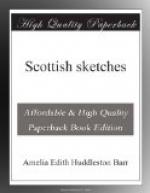“Gude-e’en, if thou comes on a gude errand,” said old Dame Alison, suspiciously; “but that’s no thy custom, bailie.”
“I came, dame, to ask John anent Peter Fae.”
The dame laughed pleasantly. “If thou had asked him anent Margaret Fae, he could tell thee more about it.”
“This is nae laughing matter, dame. Peter Fae has been murdered—yes, murdered! An’ he said, ere he died, that John Sabay did the deed.”
“Then Peter Fae died wi’ a lie on his lips—tell them that, John,” and the old woman’s face was almost majestic in its defiance and anger.
“I hae not seen Peter Fae for a week,” said John. “God knows that, bailie. I wad be the vera last man to hurt a hair o’ his gray head; why he is Margaret’s father!”
“Still, John, though we hae nae warrant to hold thee, we are beholden to do sae; an’ thou maun come wi’ us,” said Bailie Inkster.
“Wrang has nae warrant at ony time, an’ ye will no touch my lad,” said Alison, rising and standing before her son.
“Come, dame, keep a still tongue.”
“My tongue’s no under thy belt, Tulloch; but it’s weel kenned that since thou wranged us thou ne’er liked us.”
“Mother, mother, dinna fash theesel’. It’s naught at a’ but a mistake; an’ I’ll gae wi’ Bailie Inkster, if he’s feared to tak my word.”
“I could tak thy word fain enough, John—”
“But the thing isna possible, Inkster. Besides, if he were missing Monday morn, I, being i’ some sort a relation, wad be under suspicion o’ helping him awa.”
“Naebody wad e’er suspect thee o’ a helping or mercifu’ deed, Tulloch. Indeed na!”
“Tak care, dame; thou art admitting it wad be a mercifu’ deed. I heard Peter Fae say that John Sabay stabbed him, an’ Ragon Torr and Hacon Flett saw John, as I understan’ the matter.”
“Mother,” said John, “do thou talk to nane but God. Thou wilt hae to lead the prayer theesel’ to-night; dinna forget me. I’m as innocent o’ this matter as Christine is; mak up thy mind on that.”
“God go wi’ thee, John. A’ the men i’ Orkney can do nae mair than they may against thee.”
“It’s an unco grief an’ shame to me,” said Tulloch, “but the Sabays hae aye been a thorn i’ the flesh to me, an’ John’s the last o’ them, the last o’ them!”
“Thou art makin’ thy count without Providence, Tulloch. There’s mair Sabays than Tullochs; for there’s Ane for them that counts far beyont an’ above a’ that can be against them. Now, thou step aff my honest hearthstane—there is mair room for thee without than within.”
Then John held his mother’s and sister’s hands a moment, and there was such virtue in the clasp, and such light and trust in their faces, that it was impossible for him not to catch hope from them. Suddenly Bailie Tulloch noticed that John was in his Sabbath-day clothes. In itself this was not remarkable on a Saturday night. Most of the people kept this evening as a kind of preparation for the Holy Day, and the best clothing and the festival meal were very general. But just then it struck the bailies as worth inquiring about.




